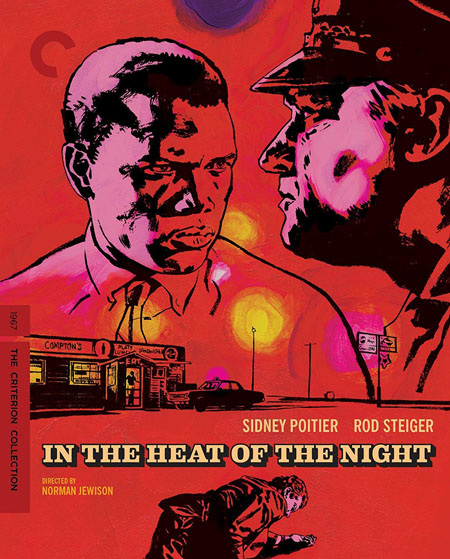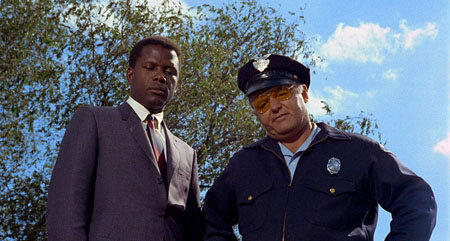
“A SLAP HEARD AROUND
THE WORLDâ€
By Raymond Benson
The
year 1967 was a milestone for actor Sidney Poitier. First, To Sir, with Love garnered sizable box-office for this British
picture, and then Hollywood produced In
the Heat of the Night and Guess Who’s
Coming to Dinner, two back-to-back revolutionary movies that solidified Poitier’s
position not only as Tinsel Town’s only black leading man at the time, but also
as an icon of the civil rights movement and the
representative—certainly not by choice—of his race in films to the rest of
America. Throughout his career, Poitier maintained an intelligence and dignity
that was tangible, and this is what made him such a charismatic star.
Both
In the Heat of the Night and Guess Who’s Coming to Dinner were Oscar
nominees for Best Picture. A winner of five awards, Heat took home the gold. Rod Steiger, Poitier’s dynamic co-star,
won the Best Actor trophy. Hal Ashby and Stirling Silliphant were honored for,
respectively, editing and the adapted screenplay (based on the novel by John
Ball). It was a year of tough competition (The
Graduate and Bonnie and Clyde were
also nominated).
While
In the Heat of the Night is still a
terrific movie today, one must place it in the context of the year it was
released to fully understand its impact. The civil rights movement was at its
height. The nation’s television sets were full of images of marches, riots, and
violence. It seemed as if we were sitting on a powder keg, and Heat perfectly captured the tension of
the moment by telling a story set in the South of a racist police chief and a
black detective who unwittingly join forces to solve a murder.
Virgil
Tibbs (Poitier) is a homicide detective from Philadelphia who happens to be
passing through town on the night a prominent white businessman is found
murdered. Arrested at the train station, Tibbs is brought to Chief Gillespie
(Steiger) and the truth comes out that they have the wrong man. Before he can
leave town, though, Tibbs finds himself embroiled in the investigation—and ends
up leading it—while all around him is the threat of danger due to the color of
his skin.

And
then there’s the infamous scene which many critics and film historians called
“the slap heard around the world.†Tibbs and Gillespie go to a cotton
plantation to interview the deceased’s primary competitor, Endicott (Larry
Gates), who is obviously put off by being questioned by a black man. At one
point, he slaps Tibbs—but Tibbs immediately retaliates by slapping the man in
return. In 1967, this was positively shocking. It’s the key moment in this
powerfully-directed picture.
Warren
Oates and Lee Grant also deliver strong performances as a police deputy and the
widow of the murder victim, respectively. With the innovative blues score by
Quincy Jones (and title theme sung by Ray Charles), Haskell Wexler’s gritty
cinematography, and the perfect script by Silliphant, In the Heat of the Night is one of the classic American films.
The
Criterion Collection’s new Blu-ray contains a 4K digital restoration with an
uncompressed monaural soundtrack. The visual quality is much improved over the MGM
Blu-ray of a few years ago (but, unfortunately, does not include the audio
commentary by Jewison, Grant, Steiger, and Wexler from the earlier disk).
Still, there are some good supplements. Brand new interviews with Norman
Jewison and Lee Grant are informative, especially Grant’s treatise on the
blacklisting she had undergone. A new interview with Aram Goudsouzian, author
of Sidney Pointer: Man, Actor, Icon,
presents a capsule portrait of Poitier and his place in Hollywood through the
years. A vintage interview of Poitier from a 2006 AFI piece illustrates the
making of the picture. Ported over from the previous MGM disk is the 2008 documentary,
Turning Up the Heat: Movie-Making in the
60s, which features Jewison, Wexler, and producer Walter Mirisch, plus
contemporary filmmakers John Singleton and Reginal Hudlin on the making of the
film. Quincy Jones: Breaking New Sound,
also from 2008, explores the movie’s soundtrack and features Jones, lyricists
Alan and Marilyn Bergman, and Herbie Hancock. The theatrical trailer is
included, and the accompanying booklet features an essay by critic K. Austin
Collins.
In the Heat of the
Night is
a landmark drama that broke new ground on several fronts… but also at its heart
is a cracking good murder mystery! A must-see masterpiece.
CLICK HERE TO ORDER FROM AMAZON